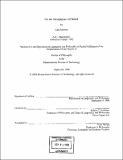On the metaphysics of belief
Author(s)
Spencer, Cara (Cara J.), 1971-
DownloadFull printable version (10.42Mb)
Advisor
Robert C. Stalnaker.
Terms of use
Metadata
Show full item recordAbstract
There is a traditional picture of belief, according to which someone's having a belief is that person's standing in a certain relation to an abstract object, a proposition. My dissertation examines the metaphysical demands that two problems for this picture of belief make on these abstract objects. The first problem comes to us from Frege's "On Sense and Reference," and the second concerns a certain sort of one's beliefs about oneself, which I call "indexical belief." Frege notes that someone can believe that Hesperus is Hesperus without believing that Hesperus is Phosphorus. It is a short step from Frege's observation to the claim that the sentence "A believes that Hesperus is Hesperus" could be true while "A believes that Hesperus is Phosphorus" is false. Quine has insisted that we cannot address this problem by taking either of these sentences to express a predication of the referent of both names, the planet Venus, as then both sentences would express the same predication of the same object, and this stands in evident tension with the fact that they can differ in truth value. In a recent response to Frege's problem, Mark Richard has taken exactly the route Quine has warned against. In my first chapter, I show that Richard's response is unsuccessful. I then consider the implications of the failure of his response on his proposed semantics for belief and the philosophical motivation he provides for it. I argue that his semantics for belief ascriptions stands in serious tension with its purported philosophical motivation. In the second and third chapters, I turn to the problem about indexical belief. The task of the second chapter is to identify this problem. To this end, I consider three of John Perry's arguments that the traditional picture of belief cannot accommodate indexical belief. I show that even if these arguments are sound, they give us no reason to think that the problem about indexical belief is in any way unique. I then suggest that there is a special problem about indexical belief, despite the failure of these three arguments to isolate it. Special difficulties attend an account of what it is to retain a tensed belief over time, and I suggest that the special problem about indexical belief is, in brief, a generalization of this problem about retention of tensed belief. In the third chapter, I raise the problem about indexical belief in a new way, as arising from a tension between several intuitively plausible claims about the relationship between beliefs and desires, on the one hand, and actions, on the other. This presentation of the problem brings out how the problem is special. I survey several solutions to this problem, including one due to Perry. I then argue that Perry's solution cannot characterize the specific kind of similarity between the beliefs of two different people who share an indexical belief. It allows too much to count as shared indexical belief. Thus Perry's solution inadequately addresses what I have suggested is the unique problem about indexical belief. Finally, I suggest that Frege's response to the problem I raise points the way towards an emendation of Perry's account that will enable it to suitably characterize the special way in which different people can share an indexical belief.
Description
Thesis (Ph.D.)--Massachusetts Institute of Technology, Dept. of Linguistics and Philosophy, 1998. Includes bibliographical references (leaves [119]-121).
Date issued
1998Department
Massachusetts Institute of Technology. Department of Linguistics and PhilosophyPublisher
Massachusetts Institute of Technology
Keywords
Linguistics and Philosophy
